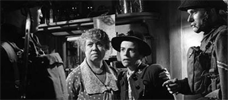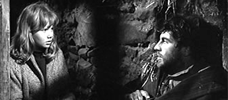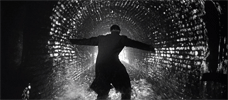Reviews
Bryan Forbes
UK, 1961
Credits
Review by Michael Nordine
Posted on 13 May 2011
Source 35mm print
Categories TCM Classic Film Festival 2011
Funny, isn’t it, him coming to our barn? It’s like a miracle.
This line is among the most revealing in Whistle Down the Wind. It’s spoken by a little girl named Nan who believes that Jesus Christ has taken up residence in her barn. The logic that leads to this conclusion is simple: “Jesus Christ” is what the man, who doesn’t know he’s just been asked his name, says in surprise upon being discovered by Nan’s older sister Kathy. (That the girls connect the dots as they do after hearing a woman on the street preach of His return earlier that day doesn’t seem to occur to them.) What first-time director Bryan Forbes and the native children of Lancashire, England (who make up the bulk of his cast) spend the entirety of the film exploring, and what the above quotation so succinctly conveys, is simple: the mysteries of faith as seen through a child’s eyes. This twofold concern is linked together by a mixture of innocence and naivete which Forbes uses in portraying - and, at different points, both celebrating and demystifying - the whimsy and strangeness of youth in equal measure.
The strangeness comes mostly from the fact that this man is in fact an escaped criminal. The two sisters and their brother Charlie decline to tell their parents, to keep it to themselves and await further instructions—after all, it was small-minded adults who crucified Jesus the last time he appeared in his earthly form. But there’s no way for them to realize their mistake. The man, to whom the police refer as Blakey and whose guilt is never confirmed or denied, sees no reason to tell the children the error of their ways, especially given how determined they are to protect him. There’s also no reason to expect He would show up in some glorious form, and anyway that kind of thing doesn’t cross these children’s minds. They accept him at face value without a second thought, something their older counterparts would never do. If Forbes at times depicts this preciously, it’s only as a means of subtly highlighting the inherent danger of the children’s non-decision. This man could be anyone, their parents would be quick to remind him; that he happens to have no malicious intent is mere good fortune. Their conflation of the son of God with a criminal imbues the film with an unease which, though rarely at the fore, is ever-present.
That a loose society of children in a remote English village so readily consider the appearance of Jesus Christ in one of their barns a reality is as plausible as it is bizarre. This fusion of simplicity and outlandishness is one of Whistle Down the Wind’s key attributes. Skepticism is a nonentity among the children; these are believers with little to no frame of reference for the outside world beyond what they’ve learned at Sunday school. The Lord’s teachings follow them outside the classroom and into a village dominated by nature, which is to say Creation: wind rustles grass, crows caw, the muted sky hangs low. Arthur Ibbetson’s stark black-and-white cinematography (which brings to mind The Night of the Hunter, another film depicting children and their relationship with a foreboding God) highlights the understated beauty of Whistle Down the Wind’s setting, but never at the expense of its ominousness. Ibbetson frequently captures the children in widescreen as they traverse the hills of Lancashire like so many pilgrims to whom anything could happen bot nothing ever does. In underscoring the effects the isolation of his setting has on these children, Forbes makes their trust believable: imagination compensates for the boredom so often engendered by rural life, especially for children yet to experience the ethereality they’ve so often read of firsthand.
If God and nature are the film’s two most powerful forces, then these children are the third. As Kathy, child star Hayley Mills leads a cast otherwise composed of locals whose inexperience (most had never acted before, and few ever did again) lends the film a needed authenticity. The interplay between them and the man - who, despite being alternately wanted for murder by the police and revered as God, is an almost entirely neutral force - is one of distance and miscommunication. In this regard, it’s not unlike many devotees’ relationship with the higher power in whom they put their trust and hope. Faith is a source of comfort, but with that comfort comes its own sense of hardship.
Forbes is often quite allegorical in conveying this. One scene finds the children enjoying themselves on a playground, only to have an older (and thus immediately menacing) boy appear and start causing trouble. A younger boy begins chanting “We know something you don’t know” by way of mocking response and is presently joined by his friends. The older boy then twists his arm until he first says that they’ve seen Jesus and then, after much resistance, give the false confession that it isn’t Him. Interloper and persecutor, the older boy serves as a stand-in for the sort of intolerance believers and nonbelievers alike have had to endure for centuries. Another moment places the listless man among the barn’s roof beams, an absent God who gives no answer when asked by Charlie whether his kitten is in heaven1 and why it had to die in the first place. The silence Charlie is met with causes him to undergo a crisis of faith that establishes him as one for whom belief in a higher power is contingent upon, if not good things happening, then certainly a good reason why not. Later, when the man is patted down by police, he extends in a manner clearly meant to resemble Jesus on the cross. When seen from a distance, he finally takes on the Christlike air expected of him.
Though admittedly simple, Whistle Down the Wind leaves much to ponder. This is important of a film whose focus lies in the answers we make up on our own when none come to us from without. It isn’t only God who works in mysterious ways, and the sense of wonder we keep to ourselves as children tends to go forgotten by us as adults. Whistle Down the Wind is alive with this spirit, which is as eternal as it is fleeting.
More TCM Classic Film Festival 2011
-

The Outlaw Josey Wales
1976 -

A Place in the Sun
1951 -

Went the Day Well?
1942 -

Becket
1964 -

Whistle Down the Wind
1961 -

The Constant Nymph
1943 -

The Third Man
1949
We don’t do comments anymore, but you may contact us here or find us on Twitter or Facebook.



